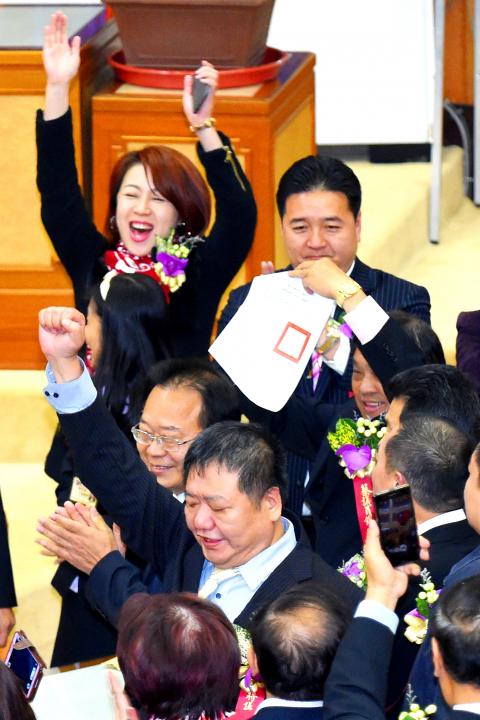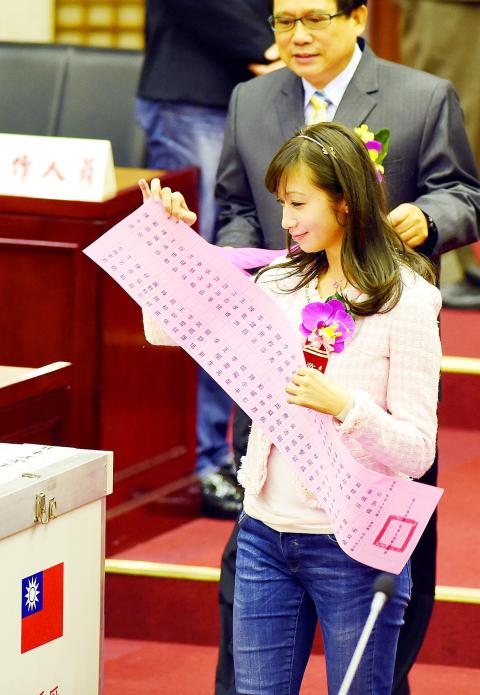On the day of the inauguration of newly elected city, municipality and county heads, 22 councils across the country also voted to choose speakers and deputy speakers.
While the Democratic Progressive Party (DPP) secured the speakers of the Greater Kaohsiung, Yilan County and Chiayi County councils, the Chinese Nationalist Party (KMT) picked up 15, with the remaining four — Hsinchu City, Lienchiang County, Pingtung County and Chiayi City — won by independent councilors.
The Taipei City Council, where the KMT has 28 of the 63 seats and the DPP has 27, is to be presided over by the KMT after the party’s candidate had won by 32 votes to 31 for the DPP’s candidate, while the KMT’s deputy speaker candidate garnered 32 votes to the DPP’s 28.

Photo: Liu Hsin-de, Taipei Times
The New Taipei City Council, which the pan-green camp had expected to win after the DPP threatened to strip the membership of those who did not vote with the party line after 65 years of KMT rule, failed to witness a “color conversion.”
While the DPP has more seats (32) on the New Taipei City Council than the KMT (26), there are seven councilors with no party allegiance and one Taiwan Solidarity Union (TSU) councilor. With TSU Councilor Chang Chin-ting (張晉婷) and a non-affiliated councilor, Chen Shih-rong (陳世榮), being former DPP members, the pan-green camp had expected to have the upper hand in the ballot.
Two rounds of votes, both resulting in a 33-33 tie, were undertaken, before the council finally drew lots, with luck on the side of KMT council speaker candidate Chiang Ken-huang (蔣根煌).

Photo: Liao Chen-huei, Taipei Times
The tie, assuming that all of the DPP councilors toed the party line, indicated that one of the two non-DPP pan-green councilors had not voted as expected.
Chang was rumored to have been the culprit, speculation echoed by DPP Legislator Wu Ping-jui (吳秉叡) and DPP Councilor Liao Hsiao-ching (廖筱清), who directly attributed the loss to the TSU.
The TSU later released a statement saying that the TSU and the DPP had reached a consensus before the vote that the two parties would work together and require their respective party members to toe the party line.
“Following rumors that some [councilors] failed to vote in accordance with party policy, the TSU is to immediately initiate an investigation with the DPP to identify the councilors who breached the agreement and punish them by revoking their party membership,” it said.
Fuming over the outcome of the Tainan City Council vote, the DPP also announced that those who had failed to vote for the party’s own candidates would be severely punished.
To many people’s surprise, the Tainan City Council, where the DPP has a 29-16 advantage over the KMT in terms of seats, selected KMT Councilor Lee Chuan-chiao (李全教) as council speaker, after Lee secured 29 votes to DPP councilor Lai Mei-hui’s (賴美惠) 26.
The DPP said it had expected at least 31 votes, so at least five councilors had not voted as agreed.
DPP Central Review Committee chairman Liu Shih-fang (劉世芳) said that as the party had required all party members to “show their ballots” before putting them in the ballot box as a way to demonstrate their adherence to the party line, “those who failed to do so are seen as the ones who had voted against the party’s candidate and they will face disciplinary action.”
While failing to achieve the expected wins in New Taipei City and Greater Tainan, the DPP did make gains in Greater Kaohsiung and Yilan County, where the party had its speaker candidates elected for the first time in history.
Police installed six surveillance cameras in the Kaohsiung council chamber to monitor the vote and said that those exposing their ballots would be investigated.

NATIONAL SECURITY THREAT: An official said that Guan Guan’s comments had gone beyond the threshold of free speech, as she advocated for the destruction of the ROC China-born media influencer Guan Guan’s (關關) residency permit has been revoked for repeatedly posting pro-China content that threatens national security, the National Immigration Agency said yesterday. Guan Guan has said many controversial things in her videos posted to Douyin (抖音), including “the red flag will soon be painted all over Taiwan” and “Taiwan is an inseparable part of China,” while expressing hope for expedited “reunification.” The agency received multiple reports alleging that Guan Guan had advocated for armed reunification last year. After investigating, the agency last month issued a notice requiring her to appear and account for her actions. Guan Guan appeared as required,

A strong cold air mass is expected to arrive tonight, bringing a change in weather and a drop in temperature, the Central Weather Administration (CWA) said. The coldest time would be early on Thursday morning, with temperatures in some areas dipping as low as 8°C, it said. Daytime highs yesterday were 22°C to 24°C in northern and eastern Taiwan, and about 25°C to 28°C in the central and southern regions, it said. However, nighttime lows would dip to about 15°C to 16°C in central and northern Taiwan as well as the northeast, and 17°C to 19°C elsewhere, it said. Tropical Storm Nokaen, currently

‘NATO-PLUS’: ‘Our strategic partners in the Indo-Pacific are facing increasing aggression by the Chinese Communist Party,’ US Representative Rob Wittman said The US House of Representatives on Monday released its version of the Consolidated Appropriations Act, which includes US$1.15 billion to support security cooperation with Taiwan. The omnibus act, covering US$1.2 trillion of spending, allocates US$1 billion for the Taiwan Security Cooperation Initiative, as well as US$150 million for the replacement of defense articles and reimbursement of defense services provided to Taiwan. The fund allocations were based on the US National Defense Authorization Act for fiscal 2026 that was passed by the US Congress last month and authorized up to US$1 billion to the US Defense Security Cooperation Agency in support of the

PAPERS, PLEASE: The gang exploited the high value of the passports, selling them at inflated prices to Chinese buyers, who would treat them as ‘invisibility cloaks’ The Yilan District Court has handed four members of a syndicate prison terms ranging from one year and two months to two years and two months for their involvement in a scheme to purchase Taiwanese passports and resell them abroad at a massive markup. A Chinese human smuggling syndicate purchased Taiwanese passports through local criminal networks, exploiting the passports’ visa-free travel privileges to turn a profit of more than 20 times the original price, the court said. Such criminal organizations enable people to impersonate Taiwanese when entering and exiting Taiwan and other countries, undermining social order and the credibility of the nation’s